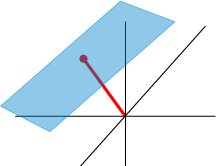Section3Criteria for Excellence
¶Learning narratives: These narratives are perhaps the most important assignments in the course. They frame each portfolio in the course by explaining to the reader:
- (Before beginning work on the portfolio) What do I know about these topics already? Where have I seen these terms and/or solved these types of problems in the past? Other than unfamiliarity with the material, what more specific questions do I have about this material and/or what am I most interested in learning about it? What am I most concerned about in the material ahead? What goal(s) do I have for my learning and/or my performance in this portfolio?
- (After completing work on the portfolio, before submission) What did I learn in this portfolio? Did I reach the goals set forth in the assignment? For each learning standard and goal in this assignment, what evidence have I included in my portfolio that I meet that learning standard? Why does my evidence show that? If one or more learning standard was not met, what would I like to do to improve on that standard between now and the final exam period?
Your learning narrative should be the first item in your portfolio for each portfolio you submit. Please typeset this narrative using a word process or Overleaf, and upload it to your portfolio as a DOC/DOCX or PDF (preferred). Minimum length is 500 words, and your pre-portfolio and post-portfolio responses (1. and 2. above) should be clearly sectioned in your narrative writeup.
Reading and annotating: The goal of these assignments is that you gain experience reading mathematical ideas carefully, asking and helping classmates to answer "good" questions about mathematical material, and locating and sharing helpful resources from elsewhere online. To complete these assignments, read the linked section and add your annotations to our Linear Algebra Hypothes.is group. Remember, everyone in the class can see and interact with your annotations.
In each section, do at least two of the following five things.
- "I notice..." Describe what about this passage sticks out to you. How is it related to other ideas, either from our class or from previous classes like calculus? How would you describe this idea in your own words?
- "I wonder..." Speculate on the deeper meanings/connections of this idea. What else might be true, based on what you read here? Where else might it be useful, outside of real analysis?
- Ask a clarifying question. When you encounter a passage that you don't understand after several readings, formulate a question whose answer would most help to clarify your thinking. Your question should tell the reader both what you do understand about the topic, and what about the writing is confusing for you. A question that says only "I don't get this?" or "What does this mean?" is likely not to receive credit.
- Answer a classmate's question. Choose "Reply" in a classmate's comment and respond to it. Address their question directly and specifically, providing references to other places in the text where appropriate. Try to give an answer that will most clarify their understanding.
- Share a helpful video. Locate a video on YouTube that you find helpfully explains or clarifies the material you're reading. Embed that video in a Hypothes.is comment (How? Click here) and write 1-2 sentences explaining what question(s) you had about the reading and how your understanding was improved by the video. (Try to avoid using videos Dr. S has uploaded. Find someone else's perspective!)
Piazza discussions: The goal of Piazza is to provide a place for you to collaborate with your instructor and your classmates during the problem solving process, with a particular focus on stimulating discussion around the conceptual and proof-based elements of the course. You're invited to participate in these discussions at least several times per portfolio in the course.
Contributions you make to the Piazza discussions can be:
- "Good" questions about something you're working on. A "good" question details for the reader much of the following: (1) the specific task you're working on, (2) the specific place where you're getting hung up / confused, (3) your best guess about why you're getting stuck there, (4) what you've tried so far, including what resources you've consulted, and/or (5) what kind of feedback you're looking for. You needn't write a page worth of text; just be sure your question provides enough of the above context for the reader to be able to provide helpful suggestions.
- Feedback to others' "good" questions. Effective responses address the "good" question's request for feedback in ways that help to further understanding, but not give away an entire solution. Where good questions can be lengthy, good feedback to those questions is often brief and incisive.
